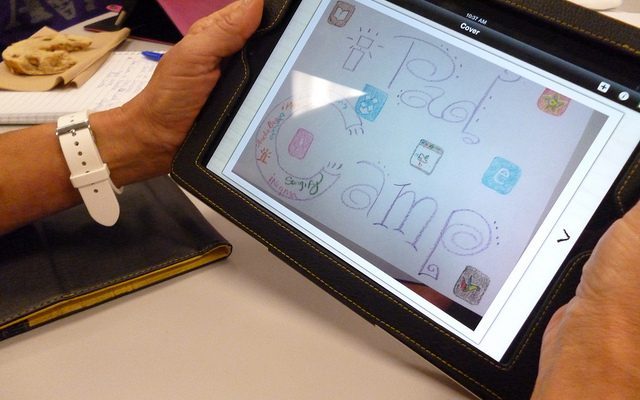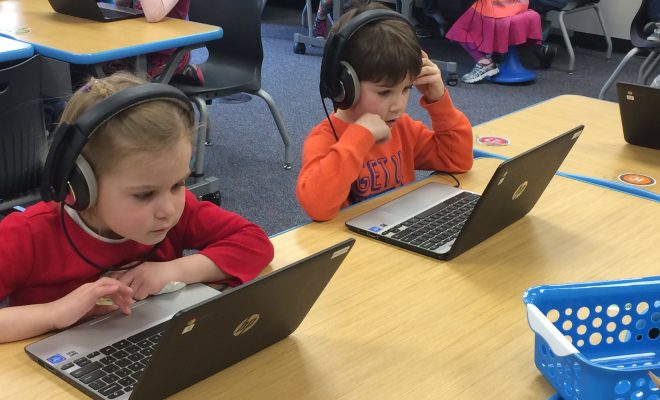Beyond the shine : Finding the technology in the standard

**The Edvocate is pleased to publish guest posts as way to fuel important conversations surrounding P-20 education in America. The opinions contained within guest posts are those of the authors and do not necessarily reflect the official opinion of The Edvocate or Dr. Matthew Lynch.**
A guest post by Mike Gorman
I remember when I first started using digital technology in the classroom. I was in awe of the amazing Apple Classic and programs such as Claris Works and Hyper Card. In fact, I tried to find anyway I could to make this new technology fit the curriculum. Students were so engaged with programs such as Oregon Trail and Lemonade Stand that teachers found ways to make them fit, regardless of the standards. It was 1980 something and computers had finally entered the classroom. Many times it was one computer and thirty-five students, and everyone was being mesmerized by the shine of new technology. I may have forgotten a standard or two, possible even over taught the technology at the expense of some content. It may have even been science class, but somehow we were all on the Oregon Trail… after all there must have been some wildflowers along the way! The lure and brightness of the Apple Classic Computer was just to captivating. I was caught in the shine of an amazing new device.
Fast forward to 2015 and one will find many schools replacing their analog tools of the past with a new digital device. Many times this takes on the focus of a “one to one” program. Visions are acquired and missions are written describing how this amazing new device will change the classroom. There is always a great deal of focus on the programs and applications that will change learning. An image is created of students learning and engaging with this new technology throughout the school day. The excitement grows and the shine becomes brighter until it is soon discovered that this amazing new tool is really only… a device. What comes next? Perhaps the most exciting stage, exploring the real possibilities that technology can bring to learning. Let’s call it the pedagogy, or process that allows classrooms to go beyond the shine.
In this post I would like to investigate how examining the curricular standards helps teachers investigate ways to integrate technology in order to facilitate student understanding of curricular content. It all really begins with something that has been around for quite awhile. You probably know them as the curriculum standards.
A portion or foundation of a curriculum is the standards. Standards make up the general knowledge of what educators want students to know. Standards are a great starting point and through careful examination, exact content and skills can be aligned with technology integration. Simply stated, examining or unpacking a standard allows a teacher to see what a child will know and be able to do. It can also help educators determine what digital resources may work best to help support learning. Now, the phrase “unpacking the standards’ may not bring out the smile you want from teachers. For this reason I will refer to it as finding the technology in the standard. Let’s take a look!
Finding the Technology in the Standard
I have actually broken it down into five tasks or steps. You may even wish to practice by applying each step below using a standard from your curriculum. As you go through the process it is important to keep focused on the task of “finding the technology and examining” … there will be ample opportunity later to think about specific lessons, activities, and resources.
Five Tasks (steps)…
- Identify the standard (sometimes referred to as a Power Standard which would be broken down to specific grade level)
- Reflect on the standard… if possible collaborate with others (What does the standards mean, why are we teaching this, what should students know, what should students be able to do, how does it apply to students at my grade level, where might it stand on a Depth of Knowledge Chart or Bloom’s Taxonomy)
- Determine the content by reviewing the standard and circling the appropriate nouns.(This will help you determine content and allow you to determine what is appropriate for your level of students. Later we will examine digital resources that will align with these nouns or content.)
- Investigate the skills by reviewing the standard and circling the appropriate verbs. (This will allow you to determine the appropriate skills to be practiced by students. This can be aligned to Depth of Knowledge, Blooms, and/or 21st century 4 C’s. Later we will be able to explore interactive technology that will help students learn and also demonstrate knowledge as seen in these verbs.)
- Create Learning Targets demonstrating what students will be able to do. (This is done through reflection and listing of verbs and nouns. The nouns allow us to state what students will know, and the verbs allow us to see what students will be able to perform or do. Digital applications and resources will blend together wonderful classroom opportunities that use these nouns and verbs to reveal the standards.)
Let me provide an example below…. note the standards
- Students will be able to research and record key facts involving the planets of the solar system.
- Students will explain orbit, gravity, and gravitational pull.
- Students will be able to collaborate on a presentation that provides what they have learned in their own words
Relevant Nouns – research, planets, solar system. orbit, gravity, and gravitational pull
Relevant Verbs – explain , collaborate , presentation
Learning Targets for students:
- I can research and explain my findings on planets and their relationship to the solar system
- I can collaborate with others to create a presentation
- I can present with others to demonstrate our our learning and understanding
At this stage it is important to look at the nouns, verbs, and learning targets in order to determine where the technology aligns. The nouns could point to numerous OER (Open Educational Resource) sites available on the internet. The verbs may point to numerous Web 2.0 tools and apps. Looking at the standards and applying this “find the tech” filter allows technology to integrate with the expected learning, rather than possibly just shine right through the learning. In the upcoming articles in this series I will focus on wonderful internet content resource sites that you should to get to know as you identify and apply the nouns. I will also point out collections of apps and Web 2.0 tools that help support the verbs. You will also discover great lesson plans collections that can be used to accomplish some of those learning targets. I do hope this provides you a reason to return and be part of the 21centuryedtech Learning Community. Please remember that the best way to avoid the technology shine is to focus on standards while you put students, not devices, at the center of learning. As you emphasize standards and students you will find there are so many amazing opportunities for learning…. beyond the Oregon Trail!
This post originally appeared on 21st Century Educational Technology and Learning and was republished with permission.
Read all of our posts about EdTech and Innovation by clicking here.
____
This is one of a series of posts that are dedicated to going beyond the shine of technology by examining ways to use digital tools to engage students in real learning. You can read the rest on Mike’s website, https://21centuryedtech.wordpress.com. You can also follow him on Twitter: @mjgormans. Please give this post a retweet and pass it on. Have a great week – Michael Gorman (21centuryedtech)






